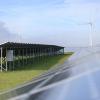Energy transition

The last few years, we see ourselves increasingly confronted with extreme weather conditions. This will only increase in the years to come. But there is a way to turn the tide: drastically reduce our greenhouse gas emissions. Therefore, we need to realise an energy transition, in which we shift our dependence on fossil fuels to zero carbon electricity. And we need to do it now!
Global energy transition
The need for this transition has also become clear to world leaders. The US wants to be carbon neutral by 2050 and China by 2060. The EU aims for complete climate neutrality by 2050. From then on, the amount of greenhouse gases released into the atmosphere may not exceed the amount that nature or technology can remove. Jan De Nul joins in, as a European company, as an energy consumer, and as an expert who helps to build green energy production.
Offshore and onshore green energy production
Everything starts with the production of renewable electricity by using the abundance of natural resources, such as the sun and wind. Jan De Nul is a pioneer in the installation of offshore wind turbines and bringing the produced electricity to shore. By connecting the different energy systems, our cable laying vessels secure the energy supply and integrate more renewables.
Renewable energy sources will have to provide the majority of electricity production. Today, the trend towards larger wind turbines to meet the increasing demand of green energy is more than present, within and outside Europe.
-
Next generation vessels Voltaire and Les Alizés
Wind turbines will have enormous dimensions and installation heights, and will have increasingly larger foundations. Jan De Nul is investing to offer clients the most efficient installation method. With a crane capacity of more than 3,000 tonnes, our offshore jack-up installation vessel Voltaire can install wind turbines with a height of more than 270 metres and blades of 120 metres long. Our floating installation crane vessel Les Alizés is able to transport and install foundations up to 2,500 tonnes.
-

How a polluted landfill became a solar panel park
In our pilot project Terranova, we completely redeveloped a polluted and neglected gypsum mountain into one of the largest interconnected solar panel parks in the Benelux. Soon, the site will be equipped with a wind turbine, generating energy for exploring possibilities with green hydrogen production.
The (clean) sky is the limit
In order to help others produce green energy, we have to be green ourselves as well. In our sustainable awareness programme Code Zero, we formulate our ambition towards zero emissions. For some years now, Jan De Nul has been using a ULEv filter system that treats exhaust gases and prevents the emission of nanoparticles. This filter technology complies with the stricter European EURO STAGE V directives regarding emissions on land and on waterways.
Decarbonising our company
Jan De Nul is working on its decarbonisation as a company. A selected number of vessels have switched to operating on second-generation biofuel, which we are still further exploring. But the energy transition for shipping will rely as well on electrochemical processes to store renewable energy on board. In our pilot project Terranova, we are testing the possibilities of green hydrogen with excavators that runs on hydrogen. For us, the most promising road leads to the use of green methanol. Combined with our ULEv filter system, vessels will generate extremely low emissions of NOx and particulates among other things.
We are also looking into other more cost-efficient solutions. We have designed our newbuild vessels Voltaire and Les Alizés to generate as little impact on the environment as possible. These gasoil-powered vessels are equipped with a highly advanced dual exhaust gas filtration system comprising a Selective Catalytic Reduction (SCR) and a Diesel Particulate Filter (DPF). On top of that, Les Alizés will also be equipped with a battery that will recover energy during certain actions.
OUR CODE ZERO COMMITMENT
But how can we put them into practise? Our awareness programme Code Zero unites all sustainable initiatives into four pillars: Zero Emissions, Zero Accidents, Zero Waste and Zero Breaches. A milestone, rather than a starting point. And only one piece of the puzzle. To make a real difference, we need everyone’s support, from our own employees and clients to suppliers, local communities and governments.